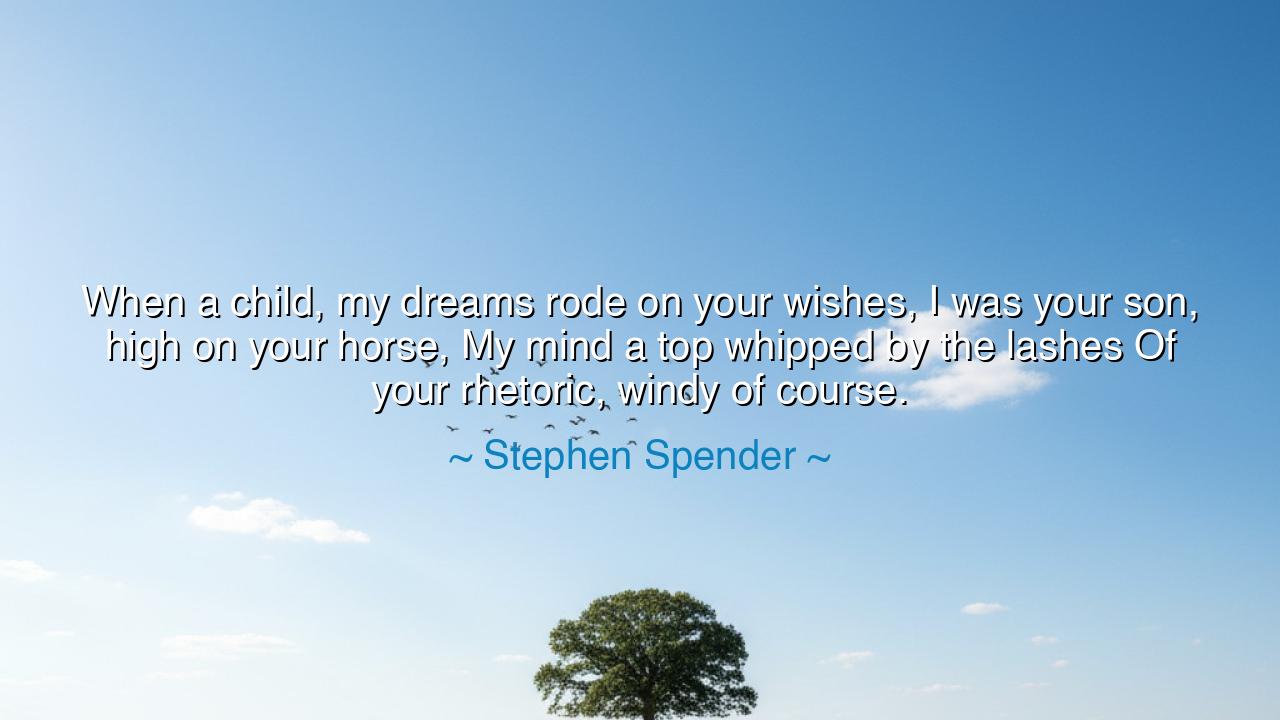
When a child, my dreams rode on your wishes, I was your son, high
When a child, my dreams rode on your wishes, I was your son, high on your horse, My mind a top whipped by the lashes Of your rhetoric, windy of course.






The words of Stephen Spender, poet of conscience and memory, rise like a wind from the depths of childhood and the storm of youth: “When a child, my dreams rode on your wishes, I was your son, high on your horse, My mind a top whipped by the lashes Of your rhetoric, windy of course.” In these lines, Spender opens the door to the tender and turbulent bond between parent and child, between the innocence of belief and the awakening of independence. He writes not only of one family, but of every soul who has ever looked up to another, only to later see the human flaws within the pedestal they once worshiped. This is not a poem of bitterness, but of awakening — a recognition that dreams once borrowed must one day be reclaimed as one’s own.
The origin of these words lies in Spender’s lifelong reflection on the forces that shape the mind and soul. A poet of the twentieth century, he belonged to an age of revolution — intellectual, social, and emotional. His generation grew up under the shadow of authority, of teachers, parents, and leaders who spoke with grandeur but often failed to match their words with truth. Spender, known for his fierce intellect and his moral idealism, often explored the tension between ideals inherited and ideals chosen. In this verse, he recalls how, as a child, he placed his trust in another’s rhetoric — the noble but hollow words of those who claimed wisdom — only to later see that much of it was “windy of course,” full of sound but lacking substance.
The imagery of “my dreams rode on your wishes” reveals the innocence of childhood, when the young live not by their own compass but by the borrowed stars of their elders. The child’s dream, in its early form, is shaped by the expectations of those he admires. He becomes, as Spender says, “your son, high on your horse” — proud, hopeful, but not yet self-directed. The horse symbolizes borrowed power — the inherited confidence and purpose of another, perhaps a father, teacher, or leader. Yet as the child grows, he begins to feel the lash of rhetoric, the sting of words that command but do not always guide. This awakening marks the beginning of thought, of identity, and of rebellion.
Throughout history, this pattern repeats. Consider the story of Prince Siddhartha, who would become the Buddha. As a youth, he lived “high on the horse” of his father’s wishes — sheltered by wealth and rhetoric, told that life was joy and suffering an illusion. But when Siddhartha left the palace and saw sickness, age, and death, he felt the lash of truth upon his soul. He realized that the teachings he inherited were incomplete, that the rhetoric of power could not quiet the hunger for understanding. In rejecting the borrowed dreams of his birth, he discovered his own — and from that awakening came enlightenment for the world.
So too, Spender’s lines remind us that growth is not betrayal, but transformation. Every generation must wrestle with the voices that came before — to test their words, to weigh their truth, to keep what is gold and discard what is hollow. The “rhetoric” of the elders, though flawed, still serves a purpose; it gives the young something to push against, a wind that strengthens their wings. The child who only obeys never matures, but the one who questions learns to see with his own eyes. Thus, Spender’s tone is both reflective and forgiving: he understands that the “wind” of rhetoric was once a guiding breeze, even if it later proved empty.
There is also in these lines a lament for lost innocence. The moment when one realizes that the words of those we adored are imperfect is a wound of the spirit. It is the death of childhood faith and the birth of mature vision. Yet this pain is sacred. It is through disillusionment that we find truth, through the cracking of old idols that we uncover the living god within. Spender’s poem whispers that wisdom often comes not through worship, but through disappointment — for it is in seeing the weakness of others that we learn the strength we must find in ourselves.
And so, my children, the lesson of Stephen Spender’s words is this: be grateful for those whose rhetoric once inspired you, but do not let their voices drown your own. Ride, if you must, upon the horses of others in your youth, but learn to walk — and one day to fly — by the power of your own conviction. Question every teaching, even those wrapped in love, for truth is not inherited; it is discovered. The lash of rhetoric may sting, but it awakens. The wind of words may fail, but from that silence arises your authentic voice.
In the end, Spender’s wisdom is both humble and heroic: to honor the past while freeing oneself from it. The child who once rode upon borrowed dreams must, in time, become the dreamer of his own destiny. For only when you take the reins of your own thought, when you rise not on another’s horse but on the wings of your own will, do you become truly alive — no longer shaped by the wind, but the maker of it.






AAdministratorAdministrator
Welcome, honored guests. Please leave a comment, we will respond soon